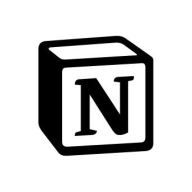

Salesforce Service Cloud and Notion compete in the customer relationship management and productivity software markets, respectively. Salesforce Service Cloud appears to have the upper hand due to its comprehensive CRM features and seamless integration with customer service operations, while Notion stands out for its flexibility and ease of use for note-taking and task management.
Features: Salesforce Service Cloud provides extensive customization, automation capabilities, and omni-channel engagement. It also integrates seamlessly with CRM systems and offers automatic upgrades. Notion offers flexibility with its database management through customizable tables, integration with third-party tools, and effective management of structured content, ideal for note-taking and task management.
Room for Improvement: Salesforce Service Cloud users face challenges with pricing, complex features, and require improved reporting and analytics. It also needs a smoother interface and more flexible knowledge management. Notion lacks offline capabilities, better mobile app performance, and more robust integration options for external systems. Both could enhance their user interfaces and customization features.
Ease of Deployment and Customer Service: Salesforce Service Cloud is primarily deployed on the public cloud with a hybrid option, offering reliability and scalability. It receives high customer support ratings, especially for paid support, aided by its expansive community. Notion provides on-premises and public cloud options but reportedly has less responsive support compared to Salesforce.
Pricing and ROI: Salesforce Service Cloud is often considered expensive, but it offers flexible pricing with extensive features and positive ROI when fully utilized. Notion has a more accessible pricing model with free and affordable plans for small teams or individuals, although costs may rise with added functionalities. Users find Notion cost-effective with improved efficiency and task management capabilities.


Notion is an all-in-one workspace that enables teams to collaborate, organize, and manage their work effectively. Its primary use case is to streamline project management, knowledge sharing, and task tracking. With its versatile functionality, Notion allows users to create and customize databases, wikis, and documents, making it a powerful tool for organizing information.
The most valuable functionality of Notion lies in its flexibility and ease of use. Users can create and link various types of content, such as text, images, files, and even embed external resources. This enables teams to centralize their work and collaborate seamlessly, eliminating the need for multiple tools. Notion's drag-and-drop interface and intuitive editing features make it accessible to users of all technical backgrounds.
Notion helps organizations by fostering transparency, improving productivity, and enhancing knowledge management. By providing a centralized platform for collaboration, teams can easily access and contribute to shared projects, reducing communication gaps and ensuring everyone is on the same page.Service Cloud is fully customizable support and help desk that provide faster, smarter service that will increase loyalty, retention, and satisfaction. From call-center software to self-service portals, our service solutions enhance your customer service with more responsive, more intuitive, more flexible support that anticipates customer needs.
We monitor all Knowledge Management Software reviews to prevent fraudulent reviews and keep review quality high. We do not post reviews by company employees or direct competitors. We validate each review for authenticity via cross-reference with LinkedIn, and personal follow-up with the reviewer when necessary.